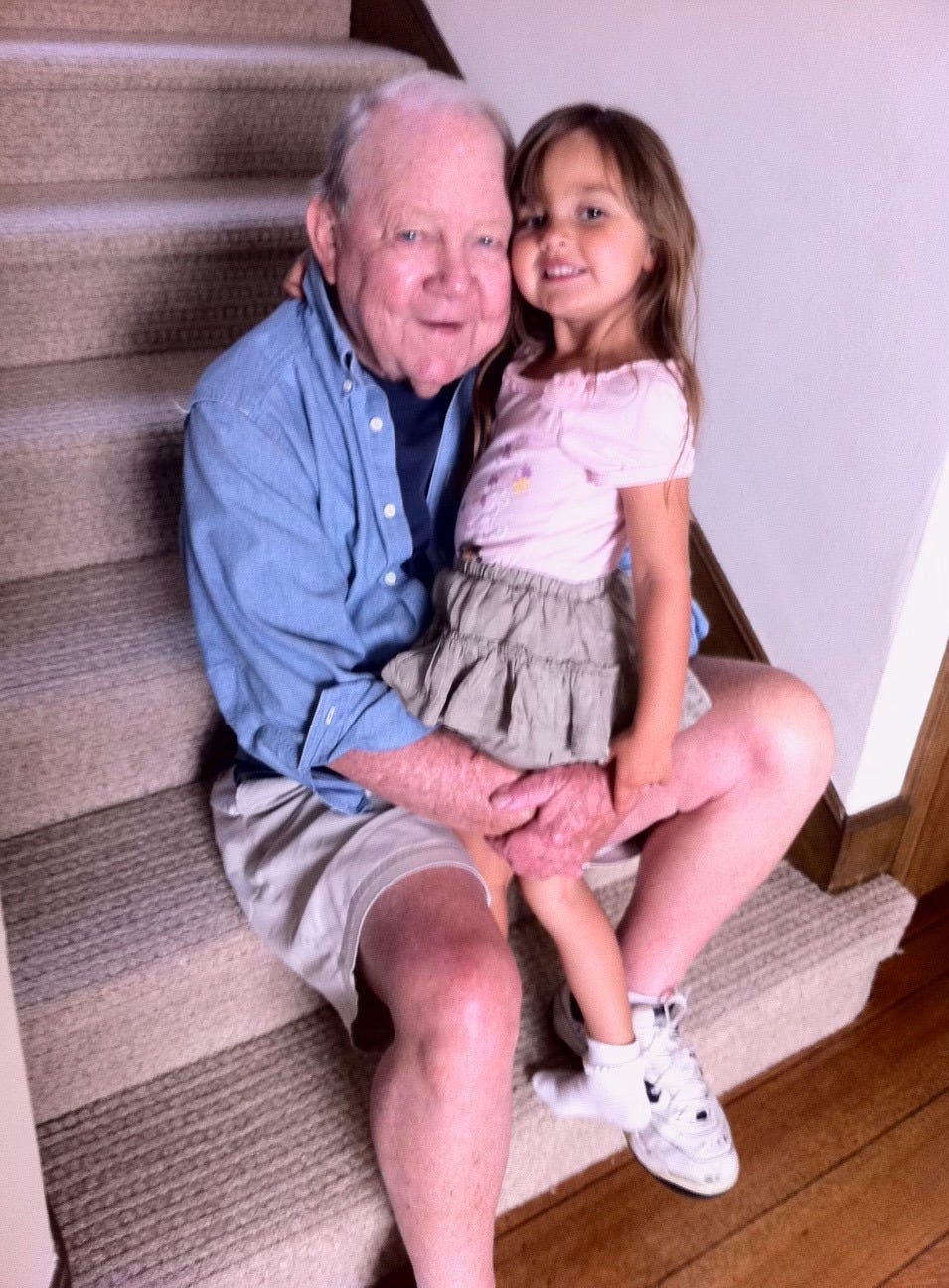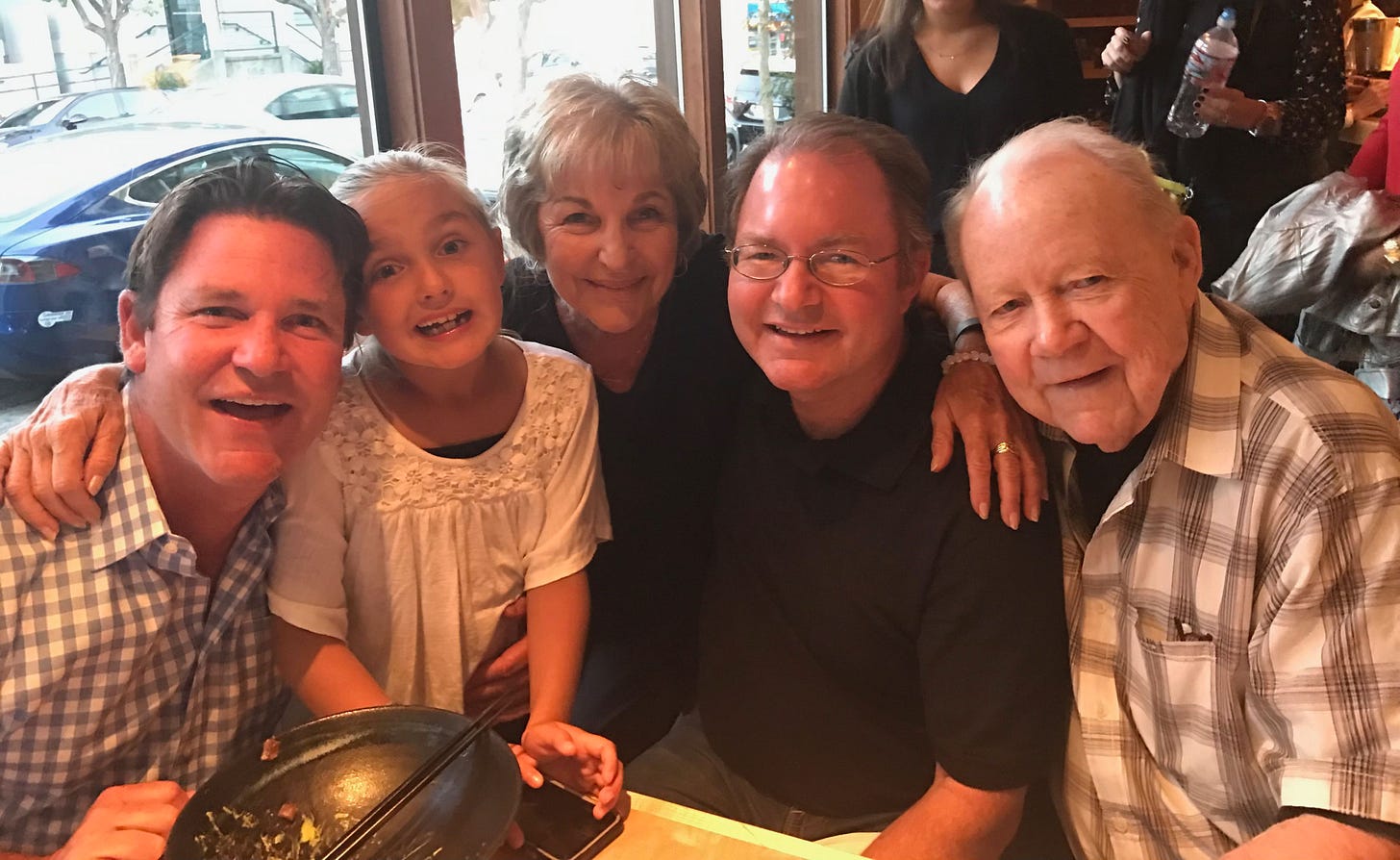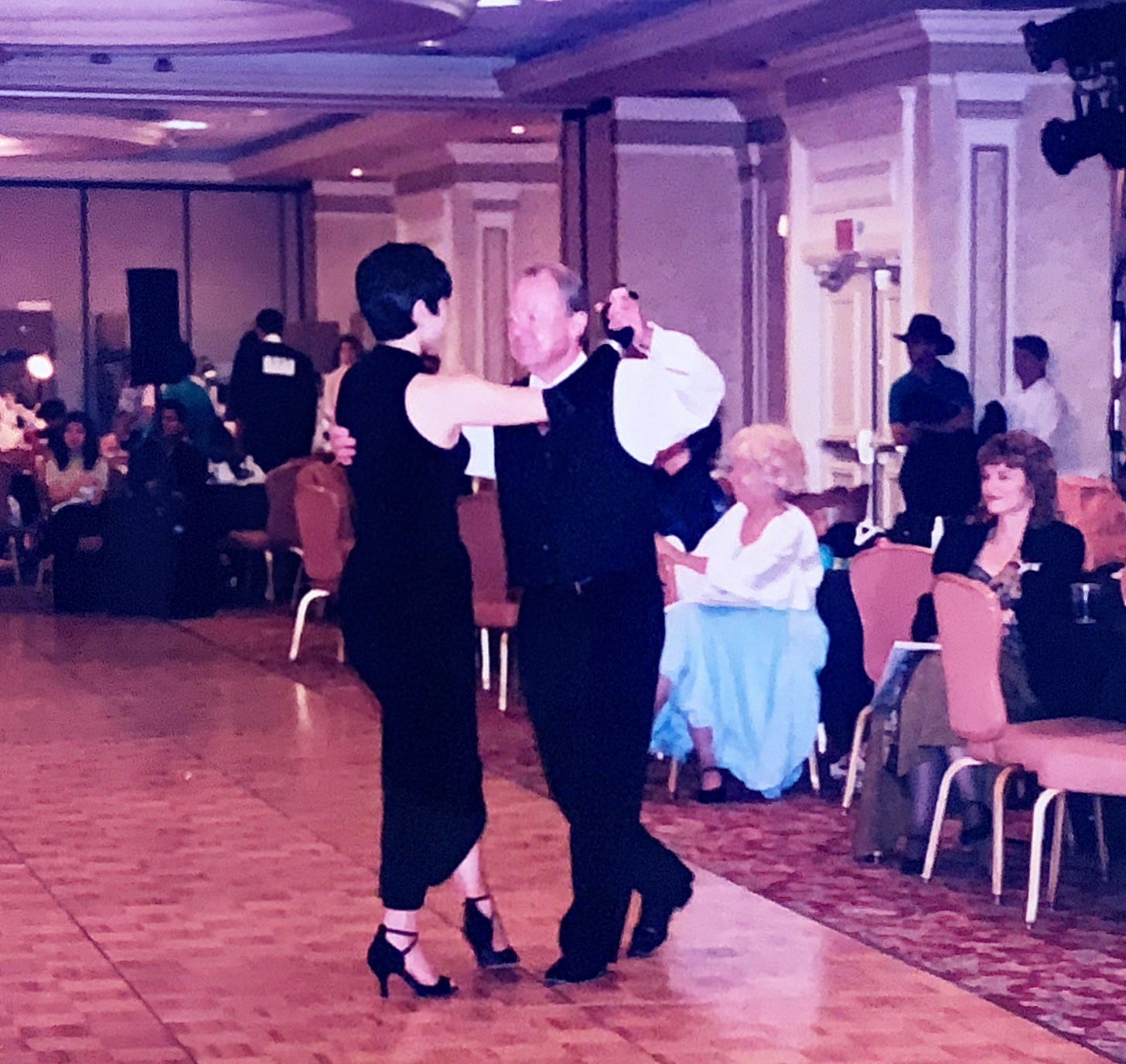Frustration to Empathy In My Dad’s Final Days
A son's journey to understand his father’s silent struggles.
My dad sharing a special moment with his granddaughter
I came over to visit my 84-year-old dad with some groceries. As I put them in the kitchen, I noticed something in the microwave. It was off, so I opened it and found a cheese enchilada inside. It was cold to the touch, discarded or forgotten about from last night.
I was getting used to this. More thrown away dinners. It didn’t boil my blood as much as earlier during the pandemic lockdown. It was now December of 2020, and I had been shopping for him since March.
That’s not to say I understood these habits and idiosyncrasies. He lived alone and refused to move to an assisted living community.
I left the kitchen and found him on the couch watching TV.
He greeted me with a low-energy “Hi, Kevin.”
Before asking him if he was hungry, I noticed something else troubling. The pathway from his couch to the kitchen looked like a small tornado spun through it. Books, cards and photos were strewn about on the floor.
“What happened here?” I asked.
“I had a fall yesterday,” he said.
“A fall? Are you hurt?”
“No, but I had a hard time getting up.”
I could hear him wheezing a bit, a side effect of his 30 years of smoking. He stopped smoking more than 25 years ago, but the lung damage had been done. He now suffered from chronic obstructive pulmonary disease (COPD), a progressive and irreversible disease.
2018 Family Dinner
“Get some air, Dad,” I said. He had a long thin tube resting on his chest, which was connected to an oxygen concentrator machine. He obliged and looped the ends of the tube around his ears and hooked the central piece to his nostrils. Soon, he was able to steady his breathing.
“How did you get up from your fall?” He didn’t answer.
When he doesn’t respond to my questions, it’s as if he’s acknowledging he’s made another bad decision. Refusing to move to assisted living. Declining to move to a first floor apartment. Refusing to get a caregiver. The list goes on.
My visits, which started weekly in March, then grew into daily and quickly brought some clarity to his limitations.
Getting my dad to accept help has been a source of tension even before the pandemic. He did, however, accept a Medicare-sponsored healthcare worker to check in on him monthly. Her name was Regina Tong. She’s skilled in dancing around these delicate topics and fleshing out what’s on my dad’s mind. She advised me to encourage him to make safety tweaks to his environment if he was unwilling to make bigger changes, like moving.
"Dad, you should move your La-Z-Boy, so the walkway is not so narrow," I suggested.
"I don't want it moved. I can get by.”
We argued for a minute, then I let it go.
"Do you want me to make you a sandwich?” I ask.
"No, actually, I'll make it. You can watch.”
That idea nearly shocked me. He was willing to give me a peek into his daily struggles.
He took five gingerly steps into the kitchen, grabbing onto a bookshelf and the top of the La-Z-Boy for balance. This pillar-to-post walking approach is how some of the elderly unwilling to use a cane or a walker get by.
He opened the fridge, took out a loaf of bread, mayo, lettuce and a tomato. He grabbed a cutting board and a knife. But just before slicing his tomato, he was winded.
“Here, do you want to sit?” I pulled out a chair.
“No, I’m going back to the couch.”
He repeated his pillar-to-post balancing act, then rested for a little over five minutes. Once he regained his strength, he returned to the kitchen to slice the tomato. Back to the couch. Rest. Return to spread mayo on his bread. Rest.
In all, it took him 40 minutes to make a sandwich.
This triggered a light bulb in my head: that cheese enchilada is sometimes not worth the effort in his mind. It can be hard for him to wait two minutes for it to heat up in the microwave when he, himself, is on a clock.
He discovered competitive ballroom dancing in his sixties
A few months ago, it would make me so frustrated when I found spoiled dinners left in the microwave. He would never explain why he’d forgotten about them, and we’d have to toss them out. I was also slow to learn that a diminishing appetite was also a symptom of his lung disease at this stage.
I couldn’t believe the insight I was getting when I watched him make his sandwich. It was like experiencing him in the wild. This was better than asking him questions and getting half truths. It was helping me really understand his plight and anxieties.
A few days later, I spoke to his pulmonary doctor about these challenges. This chat was on the phone, because my dad had refused to leave his house as his condition weakened during the pandemic. The doctor suggested getting a wheelchair and a portable oxygen concentrator. Both options were unrealistic.
For one, his second floor apartment was too cramped for maneuvering around in a wheelchair. Second, the heaviness of carrying around a portable oxygen concentrator would be such a hassle, he wouldn’t use it.
A few days later, Regina Tong, his healthcare aide, advised me to apply for a grant that would pay for a caregiver through a nonprofit called the Family Caregiver Alliance.
I was so overwhelmed, I couldn’t imagine reaching the end of this tunnel. But to my surprise, the application process was quick and straightforward. Within a day or two, I was approved. My dad, also was surprisingly receptive now to the idea of having a part-time caregiver to take a load off of me.
I reached out to a friend, who worked in the healthcare industry, to recommend a caregiving agency. He wanted to give me three options.
“Three?” I said, feeling my anxiety rise again. “Just give me your best recommendation.”
An hour later, I was on the phone with an agency. Two days later, one of its nurses was meeting with my dad for an assessment.
Memorializing My Dad, Bren Ferguson (1936 - 2023)
When my father, Bren Ferguson, passed away at 86 from complications of lung disease on February 10th, he left behind a legacy of compassion for the youth.
If you’re new here—hi, I’m Kevin.
I’m the author of 🍷 Rain on the Monte Bello Ridge,🍷 my forthcoming memoir about health, aging and winemaking. (Read the origin story of the book.) 🍇
The Centenarian Playbook is my newsletter, which usually features longevity tips and stories from Grandma Kay’s long life. It also includes stories of the Gemello Winery, which her late husband, Mario, ran for nearly half a century. Today’s post was a slight deviation from the usual stories.
Tips on Aging Well
I’d like to introduce you to Aging Well News, written by my friend Janice Walton. Her weekly newsletter aims to help readers age well despite life’s circumstances.
She provides advice on:
Taking care of a loved one,
Maintaining a healthy lifestyle
There are three buttons at the bottom of every post: “like,” “comment,” and “restack.” Restacking is sharing in digital form. It goes out to the Substack community. If you enjoy the content and click “Restack,” it helps a lot.






Heartwarming article. It’s never easy when your loved ones don’t want to lose their independence. I’m sure he’s watching over you now just as you did for him.
Hi Kevin,
As always, your email was wonderful and sad. It’s hard getting old and not having someone with you all the time. You are a great writer and also a good person
Phil